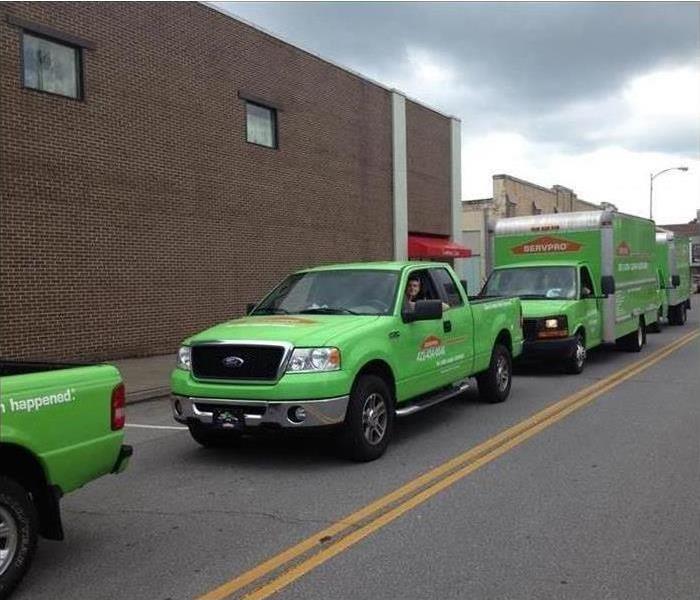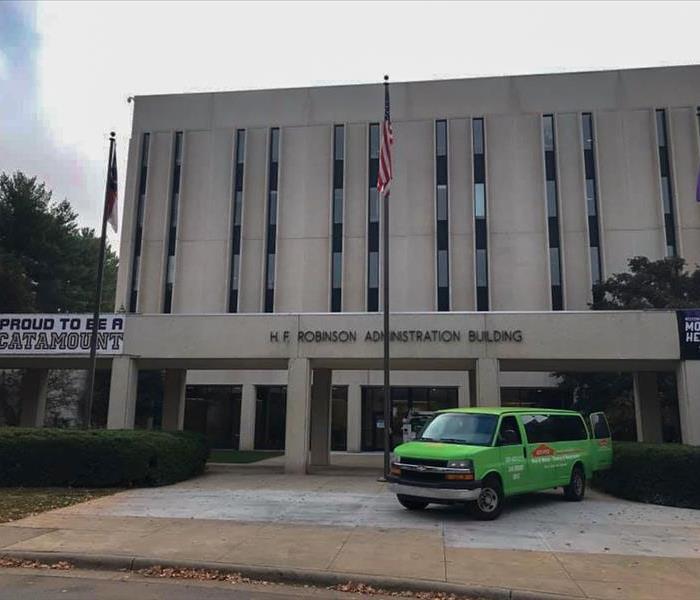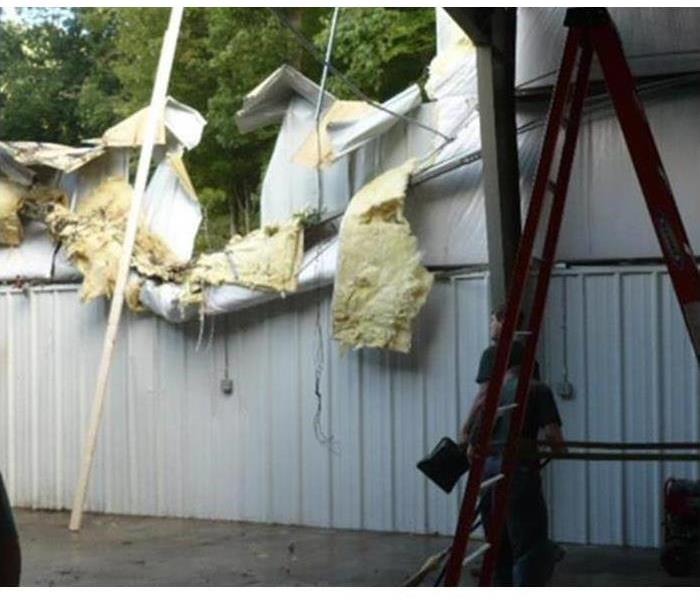Archived Commercial Blog Posts
Should You Choose the Mitigation Company to do the Rebuild?
10/7/2022 (Permalink)
 SERVPR of Nantahala can handle any job.
SERVPR of Nantahala can handle any job.
What's Involved In the Mitigation and Reconstruction Process
Restoration after a flood or other natural disaster can be a daunting process, especially if you don't know where to start. This guide will help you understand what's involved in the mitigation and reconstruction process.
There are many unknowns that can impact how long the reconstruction process takes to complete.
The reconstruction process is unpredictable. It depends on many factors, including the extent of damages and your insurance company's decision-making process. You should also consider that there are other unknowns that may impact how long it takes to complete the reconstruction project:
- The company you hire to do your rebuild may make mistakes during the rebuilding process, which can delay completion.
- If there is structural damage from high winds or flooding, then additional steps must be taken before reconstruction begins (such as removing debris).
The first thing you'll need to consider is the insurance claims process.
The first thing you'll need to consider is the information you receive from your insurance claims adjuster.
Generally speaking, insurance companies are big, impersonal corporations. They're used to dealing with claims on a large scale and don't want any trouble from their customers. If they think that you might cause them problems (for example, if they think your claim will be more complicated than others), they'll likely give your case the cold shoulder or send a low-level employee who doesn't have the authority to make decisions about it. If this sounds familiar, SERVPRO of Nantahala can help!
Another thing you'll want to decide on is whether you'll use a mitigation company that does both the cleanup and reconstruction services.
When choosing a mitigation company, you should make sure that it does both the cleanup and reconstruction services. If your home was damaged beyond repair during a flood or other natural disaster, then you'll want to ensure that your contractor can rebuild it in such a way that it's resistant to future weather conditions and damage. This means they should offer materials with high performance ratings (such as those from Shake-R-Dry) and have experience building homes in your area's climate.
Another thing you'll want to decide on is whether you'll use a mitigation company that does both the cleanup and reconstruction services. If so, consider these things:
- The company’s reputation—you need someone who has successfully completed projects like yours before.
- Their track record—does their work stay on time? Does their work stay within budget?
Choosing a one-stop-shop for the entire restoration process will go a long way toward speeding up your final walk through with the insurance adjuster.
The idea of doing everything yourself is appealing, but it can be a daunting task. It can ultimately cost more in time and money for you to try to do everything yourself than if you had hired a professional from the beginning.
A second benefit of choosing one-stop-shop companies is speedier assistance when dealing with your insurance company adjuster. Because they have already done much of the work required on their end, they are better prepared when it comes time for them to negotiate with your adjuster or assist during inspections or final walkthroughs. This allows them to move things along faster and get everyone paid faster!
With so much to think about and plan for, it can be hard to know which decisions are the right ones for your disaster recovery. If you're still unsure about any of these issues, consider getting in touch with a professional restoration company like SERVPRO of Nantahala first. We have decades' worth of experience helping others who've been through similar situations. Let us help guide you through this process with as little stress as possible!
3 Steps to Take After a Toilet Floods Your Office Building
7/19/2022 (Permalink)
Three Things to Do If a Toilet Overflows in Your Office Building
Office toilets are utilized with much greater frequency than a standard residential toilet. If you're an office manager in Nantahala, NC, it is important to have your bathroom facilities checked and maintained regularly because a flooded toilet could cause major problems for your whole building, not just your floor. If you have discovered that damage has occurred on multiple floors, there are some steps that you should take to clean up quickly and completely.
1. Call Your Insurance Company
Insurance policies differ in their coverage of sewer damage, so it's important to know what your policy states. A backup and an overflow are not the same thing, and therefore, may be expressed uniquely in your policy, or one may be covered while the other isn't.
2. Assess the Extent of the Damage
Communicate with any offices on the floors below yours. Have they experienced any problems, including leaks or bad smells? Water can soak into the floors and walls and can damage electrical wiring. Sewer damage can also cause health hazards, so if you see any obvious signs of problems or you're worried that there might be, close off the area until a professional can come to assess the damage and better inform you of any dangers.
3. Hire a Water Damage Repair Company
The more time spent on cleanup and repairs, the longer the loss in productivity will be, and the more difficult it is to take on new clients. Hire a water and sewage company that will not only assess the damage but will disinfect the areas before repairing them so that you and your coworkers can have a healthy work environment.
Sewer damage can be costly and time-consuming. Ensuring that you have an up-to-date insurance policy that covers various types of toilet-related water damage and maintaining your office's facilities can save you a headache in the event of a flooded toilet at your office.
4 Benefits of Hiring a Fire Mitigation Professional
5/5/2022 (Permalink)
 A fire not only leaves behind soot but also smoke damage and potential water damage.
A fire not only leaves behind soot but also smoke damage and potential water damage.
Four Advantages of Hiring a Fire Mitigation Expert
Dealing with the aftermath of a fire at your Cullowhee, NC, business comes with many headaches. From dealing with the insurance adjuster to assessing the fire damage and still keeping your business running, the cleanup and repairs simply add to the stress. Get back to business faster and with peace of mind by hiring a certified professional fire and water damage restoration company. Below are four benefits that make it worthwhile.
1. 24/7 Help
A disaster may strike at any time. A fire mitigation company understands that and is available 24/7 to take your emergency call. After the call is received, you can expect a quick turnaround time for the inspection and assessment.
2. Minimize Damage
Choosing a reputable contractor means choosing a one-stop-shop professional. Mitigation companies are experts at finding hidden damage and properly repairing it to ensure that there are no lingering effects. They will also have the know-how to help you salvage many items that may seem lost forever.
3. Proper Fire Damage Cleanup
A fire not only leaves behind soot but also smoke damage and potential water damage. Each type of damage requires its own unique methods and tools to repair. A restoration expert already has the industrial-grade equipment and know-how to handle whatever issues the property faces.
4. Save Time and Money
Since time is money, saving on both is an ideal solution. Tackling damaged property on your own may turn into a long process with added costs. Experts provide a detailed assessment of the work that needs to be done along with a schedule to get your business back to normal as fast as possible.
Cleaning up fire damage is a difficult and time-consuming task. By using a licensed specialist, you can focus on your business and have peace of mind that repairs will be done right.
3 Things Property Owners Should Understand About Mold Growth
3/30/2022 (Permalink)
 If you suspect black mold is growing, work with an Indoor Environmental Professional (IEP) to assess the premises.
If you suspect black mold is growing, work with an Indoor Environmental Professional (IEP) to assess the premises.
Three Things Every Property Owner Should Know About Mold Growth
Is black mold invading your business walls? Is it spreading within walls or the flooring, eating away at structural material? Business owners must act quickly to fungus, so owners in Murphy, NC, should be aware of what mold is and how to locate it. Property owners should be mindful of the answers to the following three questions.
1. What Are Common Signs of Mold?
Fungus thrives in dark, damp locations, particularly closets, crawl spaces, and kitchens. The development begins unseen and becomes noticeable through dark rings and an unusually strange, musty odor. In fact, the nose acts as one of the first indicators that the property requires mold cleanup. Owners may detect a funky or stale scent. These indicators are a cause of immediate action. The longer someone waits, the more costly and timely the repairs.
2. How Do You Know if the Mold Is Harmful?
If you suspect black mold is growing, work with an Indoor Environmental Professional (IEP) to assess the premises. This specialist is certified to investigate the rooms, determining what is reproducing and how to handle it. They may conduct several tests, including air and structural samples, comparing levels and learning how much of the space is affected. This testing is the only means of understanding precisely what has infested the business.
3. How Is Mold Removed?
To reduce the spore count and eliminate the hazard, owners should look for a mold remediation company to follow the IEP's information. These employees begin by drying out saturation and examining fixtures and belongings. Using high-tech equipment, they can clean documents and electronics. Drenched, porous objects are removed as they cannot be thoroughly sanitized. The room is washed with soap and water as well as sprayed with antimicrobial formula. Anything ruined is replaced.
When something seems amiss, it could be black mold. To know for sure, rely on an IEP to survey the building and guide you inappropriately securing and cleaning up the property.
Emergency Preparation: What Every Property Manager Should Do
2/16/2022 (Permalink)
 The damage you see in this image was caused by severe storms that impacted our area. Our team was brought in to repair the damage.
The damage you see in this image was caused by severe storms that impacted our area. Our team was brought in to repair the damage.
What Every Property Manager Should Do In Case Of An Emergency
Property management is challenging and a tremendous responsibility, especially for buildings with multiple tenants and families. A significant part of a manager’s job is emergency preparation, specifically in the terms of storm preparedness. There are at least four tasks every manager should complete to ensure the protection of every tenant.
1. Create a Contact List
Every manager should have a master contact list. This list should include specifics about the apartment or complex and the tenants living or operating there. It should include names, phone numbers, email addresses, as well as the number of children, pets and whether the people have a disability.
2. Compile Emergency Services Numbers
Beyond knowing who lives or works in the building, basic storm preparedness means having a list of all emergency service numbers. This list should be copied and posted near every phone, ensuring that anyone discovering an emergency situation knows who to call.
3. Routinely backup Emergency Lists
It is not enough to make the lists because a list is only as good as the information on it. A list with tenants that are no longer tenants will only confuse emergency services and potentially waste time and risks lives. It is crucial that all number are routinely updated to ensure accurate information.
4. Prepare an Emergency Plan with Restoration Services
Beyond having up-to-date contacts, a property manager would be doing an excellent service to their tenants by calling a disaster restoration specialist in the Cashiers, NC, area and developing an emergency response plan. These plans ensure that quick action is taken to start the restoration process, minimizing the length of time tenants have to stat out of the facility.
Storm preparedness is one of the most important elements of a property manager’s job. If done right, a manager can potentially save lives. However, if done poorly, lives may potentially be put at risk.




 24/7 Emergency Service
24/7 Emergency Service


